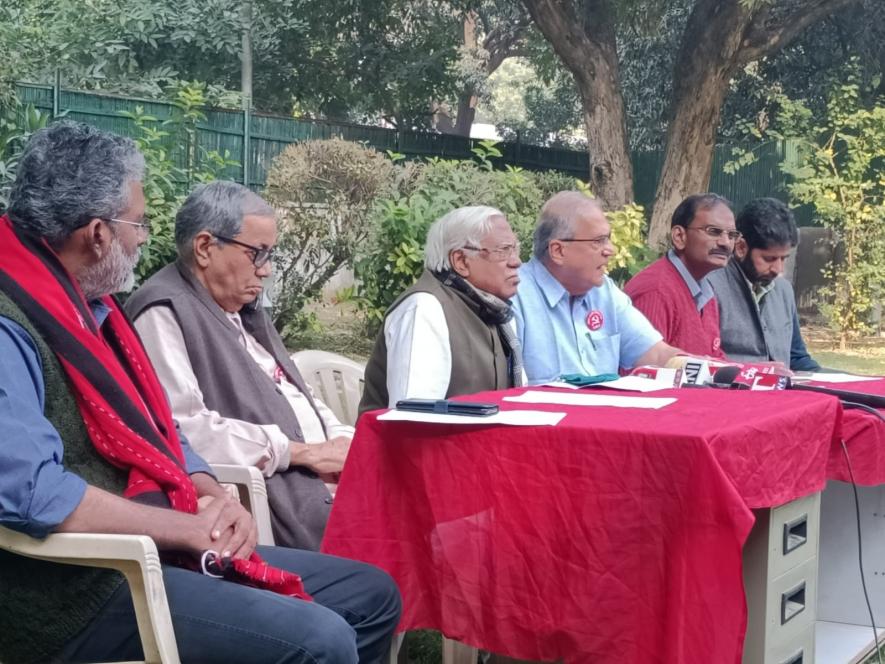Farmers’ Agitation Must Continue Till Key Demand on MSP is met: AIKS

(L to R) AIKS Finance secretary, P Krishnaprasad, joint secretary of AIKS, NK Shukla, AIKS general secretary Hannan Mollah, president Ashok Dhawale, general secretary of All India Agricultural Workers’ Union, B Venkat, and Vikram Singh, joint secretary of AIAWU at the event.
New Delhi: As the Union Cabinet approved on Wednesday the Bill to repeal the three farm laws, which would be tabled in the upcoming Winter session of Parliament, the All India Kisan Sabha (AIKS), a constituent of the Samyukt Kisan Morcha, released a ‘Note on Minimum Support Price’, an explainer on why the farmers’ agitation will continue on the demand for MSP.
Addressing mediapersons at the release function held at AIKS central office here, Ashok Dhawale, president AIKS, highlighted how “from day one of the struggle of farmers against the farm laws, the demand for a law guaranteeing MSP had been repeatedly asserted. “This struggle was never just about the repeal of the black laws. The main problem is yet to be solved,” he said.
The MSP Note says: “The repeal of the three anti-farmer laws after a year-long struggle by farmers across the country has only averted a dangerous situation that would have developed in the future. The present agrarian crisis -- marked by low prices, no assurance of government procurement, crop failures, and mounting debt -- continues to unfold under the Modi regime.”
Alleging that the Commission for Agricultural Costs and Prices (CACP), which, recommends the MSP for crops in both Kharif and Rabi seasons every year to the Central government arbitrarily calculates the support price, the Note provides a detailed table listing the losses faced by farmers due to MSPs determined with low cost of production as its basis.
“The CACP takes into account A2+FL (cost of inputs + family labour costs) as the cost of production, which is much lesser than C2 (cost calculation that also includes interests on capital and rent of land) costs. Further, there is a significant difference between CACP’s projection of C2 and the projection of the same by different states,” the Note says.
Citing an example, it mentions that for paddy, while a state government projects a C2 cost of Rs 2,114 per quintal, the CACP only calculates the same to be Rs 1,559 per quintal. “It is no wonder then, that CACP thinks that the paddy MSP for Kharif Marketing Season (KMS) 2021-22, Rs 1,940 is remunerative” it adds.
The Note details the losses farmers suffer for selling 23 crops at MSP which is not fixed at C2+50%, the rate recommended by the MS Swaminathan Commission. For most crops, the loss exceeds Rs 1,500 per quintal. Selling Cotton harvest at the prevailing MSP, for instance, would incur to the farmer a loss of Rs 2,207.5 per quintal as compared to the C2+50% MSP. The need for the latter MSP is made amply clear in KMS (Kharif markeitng season) 2021-22 when lakhs of hectares of ready-to-harvest crops have been destroyed due to natural disasters, says the Note.
For instance, it is mentioned how in the Terai region in Uttar Pradesh, floods have destroyed up to 70% of the crop and reduced yield by half or more. “UP farmers are not the only ones affected by the wrath of nature. Since October, lakhs of hectares of harvest have been lost to cyclones and unseasonal rainfall in Odisha, Bihar, Karnataka, while cotton fields in Punjab and Haryana have been ravaged by Pink Bollworm.”
Recently, NewsClick reported on how waterlogging and stagnating water have devastated paddy fields in central Haryana.
Discussing the Note, Dhawale stressed that SKM’s ‘Mission UP’ and ‘Mission Uttrakhand’ would proceed as planned. The Note, itself subtitled “Mission UP - Defeat Anti-Farmer BJP,” points out the trends of prices at which most farmers sell their produce.
“But the situation is such that, in Uttar Pradesh, due to lack of an assured price on MSP, the farmer is forced to sell paddy at ₹ 1,100-1,300 per quintal. Against C2+50%, the farmer is losing around ₹1,290 per quintal. In an acre, if the production is 20 quintals, a farmer should get ₹51,800 per acre as per C2+50%, but gets only ₹22,000,” it adds.
In the case of sugarcane, the Note elaborates how “after much uproar, the Yogi Adityanath government in view of the upcoming assembly elections increased this price to Rs 350 from Rs 325 last year. However, the condition of sugarcane farmers of Uttar Pradesh is not going to improve just by increasing the government procurement price. The sugar mills owe farmers Rs 19,536 crore, which is more than the arrears in any other state. It is also worth noting that two years ago, i.e. in 2018-19, the sugarcane farmer was owed ₹ 9,953 crore. The outstanding price doubled in two years.”
The Note also questions the Modi government’s Kisan Samman Yojana, under which, land-owning farmers are given Rs 6,000 per year. “When their losses run into lakhs of rupees, what could such a meagre amount possibly mean for the cultivator”, the Note asks.
Speaking at the event, Hannan Mollah, general secretary of AIKS condemned this scheme and terming it a policy to “hoodwink” farmers.
Mollah, who is also a former Lok Sabha MP, further mentioned how despite the Union Cabinet’s decision to pass the Bill repealing the farm laws, there was no visible “change of heart” in the government.
“Narendra Modi had promised in at least 200 public meetings during his election campaign in 2014, saying that he would pass legislation guaranteeing MSP for farmers. It is hard to believe this man,” he added.
Get the latest reports & analysis with people's perspective on Protests, movements & deep analytical videos, discussions of the current affairs in your Telegram app. Subscribe to NewsClick's Telegram channel & get Real-Time updates on stories, as they get published on our website.
























